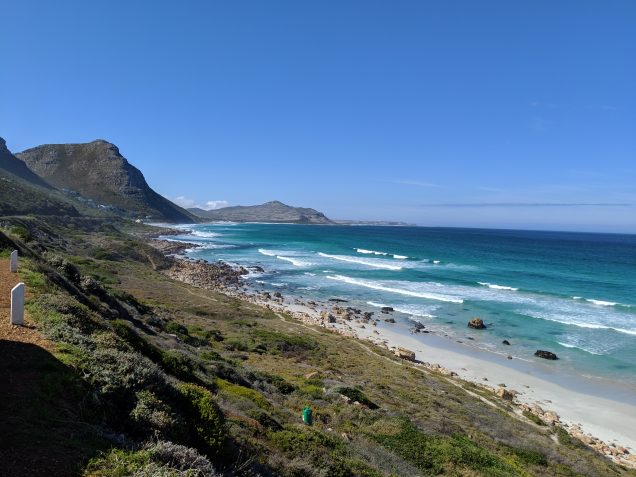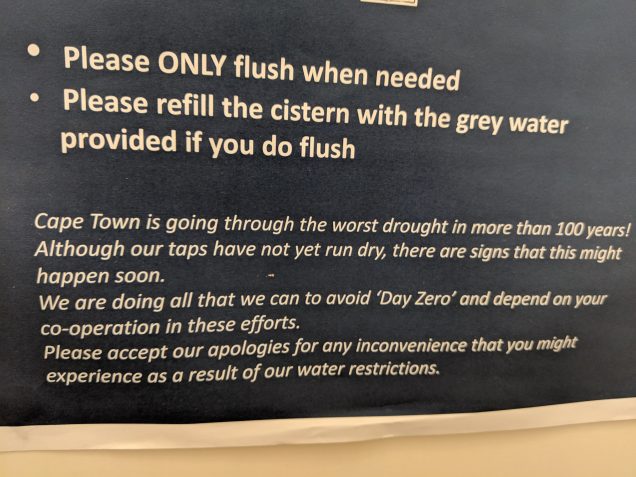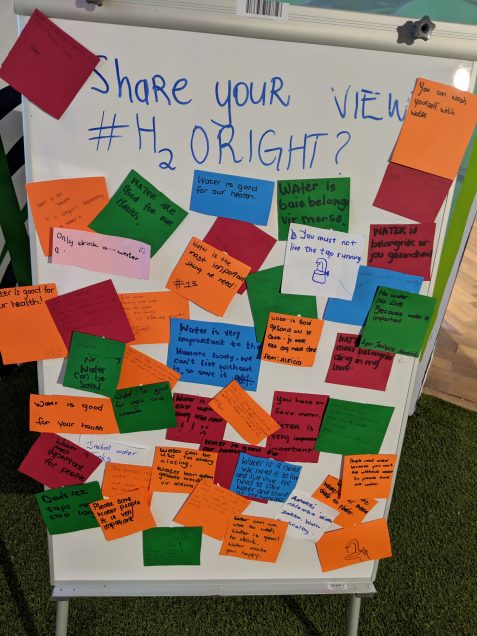Solving a crisis: Importance of education, buy-in, and sense of urgency
By Joye
It seemed to me that there were (at least) three keys to solving a crisis of that sort: education, buy-in, and a sense of urgency.
There are so many things I could write about, from the wonderful people we met at all the organizations we visited in Johannesburg, to how much we learned working on the green circular economy problem with NEPAD Business Foundation, to just the experience of traveling together in a group and getting to know our fellow classmates a bit better. I could also write about a host of problems South Africa is facing, from racial inequity to an energy crisis to its vast employment. Instead, I want to write about something that was a bit tangential to the project we worked on: the water crisis in Cape Town.

Photo: South Africa has 1,770 miles of shoreline but is experiencing the worst drought in years.
Cape Town and southern South Africa has been experiencing its worst drought in years and Day Zero was supposed to be the day that Cape Town ran out of drinking water. As such, the country has been taking drastic measures to ensure that the city did not run out of water. Everywhere in Cape Town, I saw signs of water saving measures. In tourist destinations, such as Table Mountain, all sink taps had been turned off and people were told to use the hand sanitizer instead. In one restaurant I went to, the toilet tanks had been disconnected from the bowls and users were told to dump “grey water” from a bucket next to the toilet instead. In restaurants, water did not come with your meal, instead you had to buy still or sparkling water in a bottle. I got used to these measures relatively quickly, and clearly the residents were used to them. What was incredible was how much everyone seemed to understand the water shortage and the importance they put on it.

Photo: Business and tourist attractions often had water taps turned off or signs encouraging ways of saving water
A visit to the South African Museum made me think about how South Africa approached Day Zero a bit more. This museum focuses on science and natural history. It is designed for children, but as someone who works in science education, I like to visit science museums in other destinations. The first exhibit I saw when I walked in was one dedicated to water called Global Water Story, containing all sorts of information about the water cycle and innovative ways to clean water. There was an easel asking children how to save water and it was full of post-it notes of wonderful ideas. There was a sign that said “Effort has resulted in Cape Town being the first city in the world to reduce its water consumption by 50% in just three years.” That vast of a reduction so quickly is absolutely incredible. There are a lot of problems in South Africa, but when I read that number I thought about what a model Cape Town was for the rest of the world in reducing its water consumption.

Photo: The South African Museum had a special exhibit on ways to save water
It seemed to me that there were (at least) three keys to solving a crisis of that sort: education, buy-in, and a sense of urgency. As I saw how Cape Town recovered from its water crisis, I wondered what lessons could be learned from their success. Could this same sense of urgency, buy-in, and education be applied to their energy crisis? Could they be applied to other environmental problems in other countries in order to mitigate them?
While Cape Town is not in peril for the time being, there are effects of the drought that have reached far and wide across the country. https://theconversation.com/how-droughts-will-affect-south-africas-broader-economy-111378 Many jobs were lost in the agriculture industry. The drought also has raised the price of some crops, making it harder for poor people to buy food. The project we worked on for NEPAD Business Foundation proposes job creation through farming and so droughts will play a factor in the success of these endeavors. Large established farms have better technology for irrigation and can buy drought resistant seeds, it is the small-scale farmers who will be most at risk. Hopefully lessons learned from Cape Town will help South Africa prepare for how to deal with future droughts.